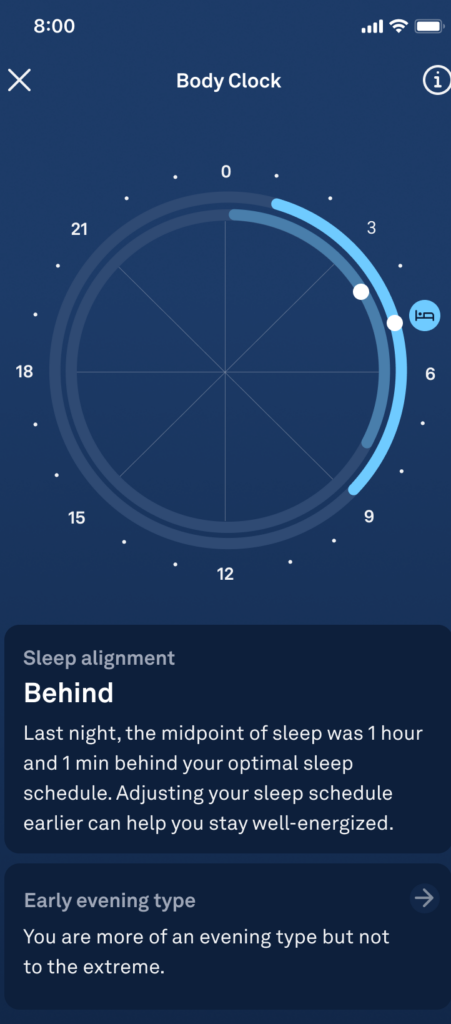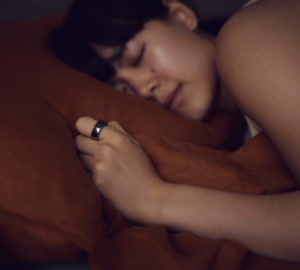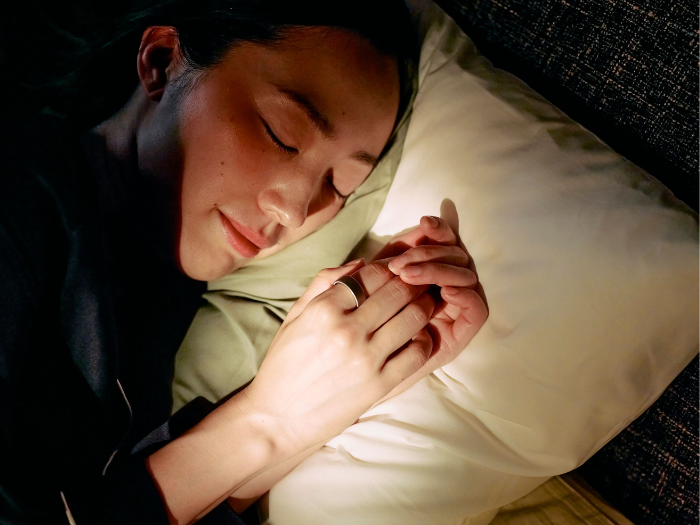If you’ve ever opened your eyes only to feel groggy, foggy, and slow to start the day, you’re not alone. This common experience is called sleep inertia. While grabbing a coffee might take the edge off, waking up tired every day can be frustrating and hard to shake.
The good news: sleep inertia isn’t random. By understanding the science behind it — and learning how to wake up when tired — you can make small adjustments that leave you feeling more alert, energized, and ready for the day ahead.
Why Do I Wake Up Tired? It Might Be Sleep Inertia
You often wake up tired because of sleep inertia — a temporary state of grogginess and reduced alertness right after waking. It can feel like “brain fog” and last anywhere from a few minutes to a couple of hours.
“Sleep inertia is that feeling of confusion, like after you wake up from a long afternoon nap,” explains Raphael Vallat, PhD, Senior Machine Learning Data Scientist at Oura and former sleep researcher at the University of California, Berkeley.
For some, it’s mild — just feeling “not a morning person.” For others, it’s more extreme, leaving them disoriented for hours. Beyond being inconvenient, sleep inertia can be dangerous. “If you have to drive, or make a life-critical decision in the first minutes after awakening, like a doctor on call, sleep inertia can have serious consequences,” Vallat comments.
Research also links sleep inertia to traffic accidents, workplace errors, absenteeism, and reduced productivity.
Is Waking Up Tired Just in Your Genes?
No, it’s not only genetic. In fact, only about 25% of how alert you feel after waking is due to genetics, while the remaining 75% comes from lifestyle factors you can control.
In a study of 833 twins and unrelated adults, Vallat and colleagues found that genes play a role in daytime alertness, but most of the variation was explained by modifiable factors like sleep amount, physical activity, breakfast choices, and mood.
Researchers identified several key factors that influence how alert you feel after waking. The study found:
| Factor | Key Finding | Why It Matters |
|---|---|---|
| How much sleep you had | Sleeping more, and especially waking later than usual, was linked to higher alertness. | Longer sleep increases the chance of waking in light sleep and helps clear adenosine, the chemical that drives sleep pressure. |
| Physical activity | Being more active during the day improved next-morning alertness. | Movement supports energy regulation and helps the body transition more smoothly into wakefulness. |
| Breakfast choices | Eating complex carbs (like oats) boosted alertness, while high-sugar meals caused the biggest drop. | Balanced meals stabilize blood sugar and help you feel more energized after waking. |
| Mood | People who reported feeling happier also felt more alert. | Positive mood and serotonin support better cognitive arousal and focus. |
| Age | Older participants tended to be more inherently alert after waking. | While not modifiable, it shows that alertness changes naturally across the lifespan. |
What Causes Sleep Inertia?
Beyond the lifestyle factors above that may influence daytime alertness, there are several causes of sleep inertia, Vallat notes. The main causes of sleep inertia are waking up during deep or REM sleep, carrying sleep debt or poor sleep quality, and being misaligned with your chronotype. Below, learn more:
1. You wake up in the wrong sleep cycle.
Sleep inertia can happen when you wake up in a deep stage of sleep, either deep sleep or REM sleep. Light sleep, as the name suggests, is the closest to wakefulness. This is the sleep stage you naturally (and ideally) wake up in, but that’s easier said than done.

In the real world, alarm clocks, light exposure, noisy neighbors, or a crying baby — among other things — can wake you up from deep sleep, before your body has transitioned to light sleep. This can result in sleep inertia.
“Waking up while in deep sleep is like trying to sprint before you’ve warmed up,” Vallat says. Not just metaphorically – literally! During deep sleep, your body temperature is the lowest. When you get abruptly woken out of deep sleep, your brain has to warm up and get some blood flowing before it can work properly. In light sleep, your body temperature is the warmest, mirroring your awakened state.
When you wake up during REM sleep – where most vivid dreams occur – you may also experience sleep inertia. In REM sleep, melatonin levels are at their peak. Melatonin, a sleep-inducing hormone, can cause the drowsy characteristic of sleep inertia.
READ MORE: Everything You Need to Know About Melatonin
2. You’ve accumulated sleep debt and/or you’ve slept poorly.
You may have gotten 10 hours of sleep last night, but the quality and quantity of sleep leading up to last night still factor into how you feel upon waking.
That’s why one contributor to your daily Oura Readiness Score is your Sleep Balance. This measures how much you’ve been sleeping in the past two weeks, with the past few nights of sleep weighing more heavily, and is an indicator of how much sleep debt you have.
Research shows that a consistent lack of sleep leads to exaggerated feelings of sleep inertia, and another study found that people who slept six hours experienced a 10% decline in cognitive performance.
Finally, even if you do sleep enough, you might not be sleeping well. Restless sleep, frequent awakenings, and sleeping later than usual can all cause sleep inertia. They disturb your sleep and your ability to transition through sleep stages.
Oura members can check their Sleep Score contributors, especially Efficiency and Restfulness, to learn more about the quality of their sleep.
READ MORE: Sleep Debt: Is It Possible to Catch Up on Lost Sleep?
3. You’re misaligned with your chronotype.

Your circadian rhythm is your body’s natural clock, and your chronotype refers to whether you’re a morning or night person. When either of these rhythms is misaligned with your daily routine, it can cause sleep inertia.
“If you’re perfectly aligned with your chronotype, waking up should feel easy,” Vallat says. “If you fight with yourself to get out of bed every morning, it’s a good indicator there’s something off with your sleep alignment.”
Night owls, unfortunately, have a higher risk of sleep inertia. While it’s a cultural norm to start the day early in the morning, these “evening types” may get their best, deepest sleep in the early hours of the morning, which can be disrupted when the alarm goes off.
On the other hand, waking up before the sun may also lead to sleep inertia. Waking up while it’s still dark can throw off your natural hormone production, triggering sleep inertia.
RELATED: How This Oura Member Learned to Embrace Her “Evening” Chronotype & Align to Her Ideal Schedule
How to Avoid Sleep Inertia
The number-one way to avoid sleep inertia is, of course, to get enough sleep — both in terms of quality and quantity. Here are other science-backed tips that can help you wake up feeling bright-eyed and bushy-tailed.
Strive for circadian and chronotype alignment. Use Oura’s Body Clock and chronotype feature to make sure you are sleeping in line with your chronotype and circadian rhythm.
Focus on consistency. Track your sleep and wake times in the Oura App, and aim to go to bed and wake up at similar times — yes, even on weekends.
Forego the alarm if you can. If you wake up only to see you still have 30 more minutes before your alarm, go ahead and get up, Vallat suggests. This is because when you awake naturally, you’re probably at the end of a complete sleep cycle. Plus, hitting the snooze button prolongs sleep inertia – so if you have to use an alarm, try not to hit snooze.
Move your body today and tomorrow. Staying physically active throughout the day reduces the likelihood of sleep inertia the following morning. With Oura, you’ll receive inactivity alerts if you’ve been stationary for 50 minutes to encourage regular movement.
Limiting daytime naps to 30 minutes, max. When it comes to naps, the earlier in the day and the shorter the better. After sleeping for 30 minutes, you move into a deeper sleep stage and are more likely to trigger sleep inertia the following morning.
|
Member Tip: Oura automatically detects naps between 15 minutes and three hours in length. |
How to Wake Up With More Energy

If you’ve woken up and you’re feeling tired and groggy, what can you do? Try the following tips:
Eat a breakfast rich in complex carbohydrates. Low blood sugar levels in the morning can exacerbate sleep inertia – but choose your morning meal wisely! Consuming a well-balanced breakfast with plenty of complex carbohydrates like oats or whole-grain bread can stabilize your blood sugar and help you feel energized.
|
Member Tip: Let Oura Meals unpack how well your choices are fueling you, so you can feel your best each day. Beat cravings and energy slumps, identify nutritional imbalances, and stay on track toward your goals. |
Don’t solely rely on coffee, but feel free to enjoy a cup. You may assume coffee would be an effective way to shake off your groggy, sleep-inertia state. In reality, “caffeine isn’t a great remedy for sleep inertia, because it takes 30 minutes to work,” says Vallat.
However, there might be a benefit to the simple ritual of brewing a cup of joe. A recent study postulated that the mere ritual of your morning brew – smelling the coffee, enjoying the taste – can signal to your brain that it’s time to start your day.
Get morning sunlight upon rising. To help reset your circadian rhythm, get daylight into your eyes as soon as you can. Morning daylight suppresses melatonin and activates your sympathetic nervous system, helping you feel alert in the morning.
Plus, a morning workout — even a super quick one — can help to kick sleep inertia to the curb. A study found that just 30 seconds of high-intensity exercise reduces sleepiness and triggers the cortisol-awakening response.
READ MORE: The Benefits of Morning Sunlight & How to Make it a Habit
Try a cold shower, cold plunge, or just a cold splash. “One of the easiest and most effective ways to counteract sleep inertia is to simply splash your face with cold water, and immerse your hands in it,” Vallat says. This adrenaline boost can regulate your body temperature as it works to warm you back up.
RELATED: 8 Science-Backed Benefits of Cold Exposure Therapy
FAQs About Waking Up Tired and Sleep Inertia
Why do I wake up tired even after 8 hours of sleep?
You may be waking up during deep or REM sleep, carrying sleep debt, or misaligned with your chronotype. Sleep quality and timing matter just as much as sleep quantity.
What is sleep inertia?
 Sleep inertia is the groggy, foggy feeling you get right after waking up. It can last anywhere from a few minutes to two hours and is linked to slower thinking, lower alertness, and reduced performance.
Sleep inertia is the groggy, foggy feeling you get right after waking up. It can last anywhere from a few minutes to two hours and is linked to slower thinking, lower alertness, and reduced performance.
How long does sleep inertia last?
For most people, sleep inertia fades within 15–60 minutes, but in some cases it can persist for up to 2 hours depending on your sleep stage, recent sleep debt, and lifestyle factors.
How can I wake up when tired in the morning?
Science-backed strategies include getting morning sunlight, eating a balanced breakfast with complex carbs, moving your body, trying cold water exposure, and avoiding the snooze button.
Is waking up tired genetic?
Partly. Research shows that about 25% of alertness is explained by genetics, but 75% comes from lifestyle factors like sleep habits, diet, activity, and mood—which means most of it is modifiable.
Why do naps sometimes make me feel worse?
If you nap longer than 30 minutes, you may enter deep sleep. Waking up from deep sleep makes sleep inertia stronger, leaving you feeling groggier than before.
Can sleep inertia be dangerous?
Yes. Making critical decisions, driving, or operating machinery in the first minutes after waking can be risky, as sleep inertia slows reaction times and impairs judgment.
RELATED: Why Your Energy Crashes in the Afternoon (And 9 Ways to Fix it)
About the Oura Expert
Raphael Vallat, PhD, is a senior machine learning data scientist at Oura. He previously worked as a sleep researcher in the Center for Human Sleep Science at University of California Berkeley (Prof. Matt Walker‘s lab). He has published extensively on the topic of sleep and human health, and his work has been featured in several major news media and podcasts. In his free time, you can find him enjoying precious moments with his amazing wife and daughter, playing music, or hiking with friends.












